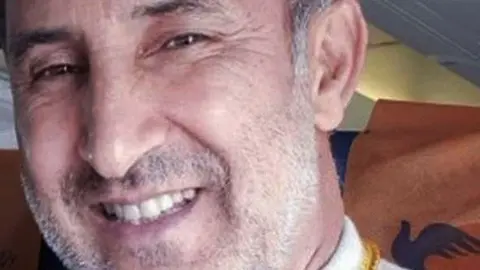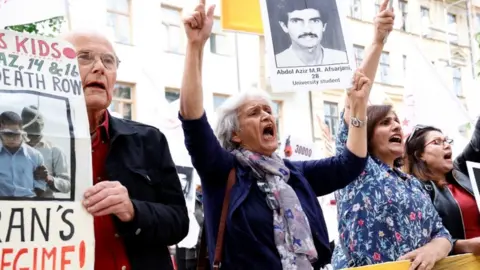Sweden tries Hamid Nouri over 1988 Iran prison massacre
 Iraj Mesdaghi
Iraj MesdaghiAn Iranian man has gone on trial in Sweden over the mass execution and torture of prisoners in the 1980s.
Hamid Nouri, 60, was reportedly a deputy prosecutor at Gohardasht prison near Tehran at the time of the killings.
He was arrested upon his arrival in Sweden in 2019 and is accused of murder and war crimes. He denies the charges.
Prosecutors invoked the principle of "universal jurisdiction" for serious crimes to bring the case.
It is the first time anyone has gone on trial over the 1988 killings of about 5,000 detainees linked to an Iranian opposition group allied to Iraq.
The executions were ordered by Iran's then supreme leader near the end of the war between Iran and Iraq.
Human rights groups have long campaigned for justice. The killings have come under renewed focus after Ebrahim Raisi was elected president of Iran.
Mr Raisi, who was sworn in last week, was one of four judges who sat on secret tribunals set up in 1988 to "re-try" thousands of prisoners for their political activities.
He has denied any role in the sentences, but has also said they were justified because of a fatwa, or religious ruling, by Iran's supreme leader at the time, Ayatollah Ruhollah Khomeini.
Dozens of exiled Iranians, former prisoners and families of the victims protested outside the court in Stockholm as Mr Nouri's trial began on Tuesday.
"For many years the regime tried to hide these massacres from the eyes of the world," said Ahmad Ebrahim, a former prisoner at Gohardasht. "I hope it will shed light to what happened to my friends who have been massacred."
 Reuters
ReutersMr Nouri is accused over the executions of "a very large number" of inmates who were members or sympathisers of the armed leftist group Mujahedin-e Khalq (MEK), also known as the People's Mujahedin Organisation of Iran, in July and August 1988.
Mr Nouri is accused of handing down death sentences, bringing prisoners to the execution chamber and helping prosecutors gather prisoners' names, according to the prosecution.
A verdict is expect in April.
